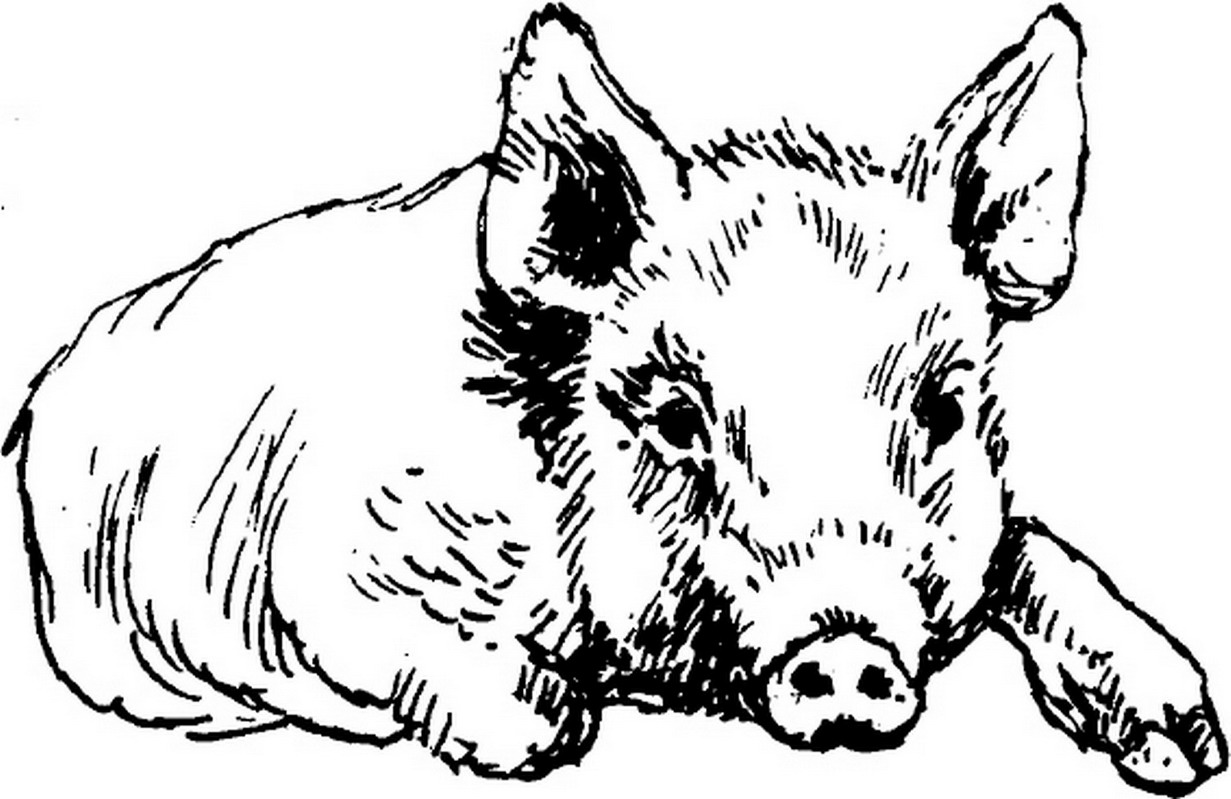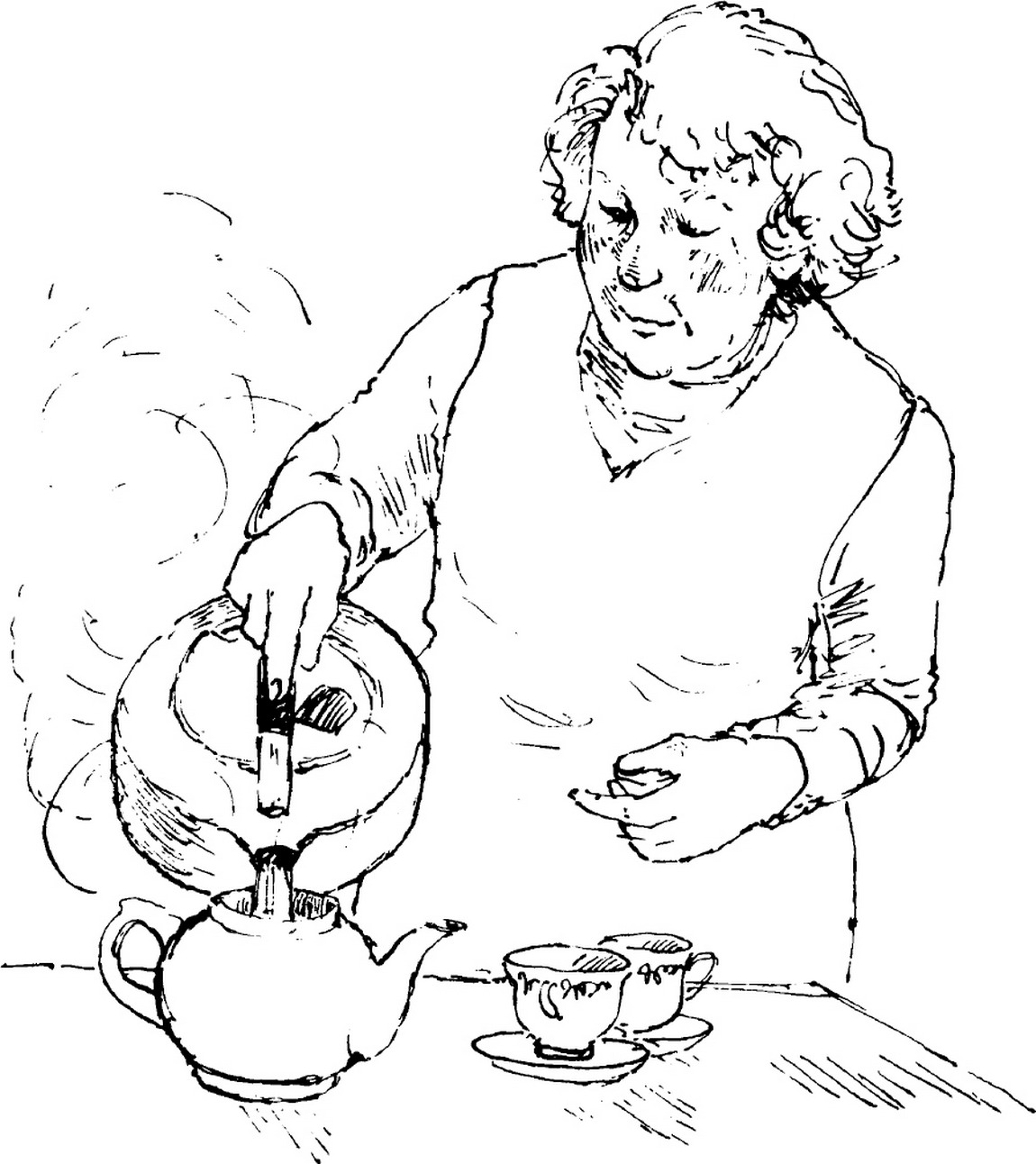CHAPTER 1
“Guess my weight”
“What’s that noise?” said Mrs. Hogget, sticking her comfortable round red face out of the kitchen window. “Listen, there ’tis again, did you hear it, what a racket, what a row, anybody’d think someone was being murdered, oh dearie me, whatever is it, just listen to it, will you?”
Farmer Hogget listened. From the usually quiet valley below the farm came a medley of sounds: the oompah oompah of a brass band, the shouts of children, the rattle and thump of a skittle alley, and every now and then a very high, very loud, very angry-sounding squealing lasting about ten seconds.
Farmer Hogget pulled out an old pocket watch as big around as a saucer and looked at it. “Fair starts at two,” he said. “It’s started.”


“I knows that,” said Mrs. Hogget, “because I’m late now with all these cakes and jams and pickles and preserves as is meant to be on the Produce Stall this very minute, and who’s going to take them there, I’d like to know, why you are, but afore you does, what’s that noise?”
The squealing sounded again.
“That noise?”
Mrs. Hogget nodded a great many times. Everything that she did was done at great length, whether it was speaking or simply nodding her head. Farmer Hogget, on the other hand, never wasted his energies or his words.
“Pig,” he said.
Mrs. Hogget nodded a lot more.
“I thought ’twas a pig, I said to meself that’s a pig that is, only nobody round here do keep pigs, ’tis all sheep for miles about, what’s a pig doing, I said to meself, anybody’d think they was killing the poor thing, have a look when you take all this stuff down, which you better do now, come and give us a hand, it can go in the back of the Land Rover, ’tisn’t raining, ’twon’t hurt, wipe your boots afore you comes in.”
“Yes,” said Farmer Hogget.
When he had driven down to the village and made his delivery to the Produce Stall, Farmer Hogget walked across the green, past the fortune tellers, the games of chance, the ferris wheel and the band, to the source of the squealing noise, which came every now and again from a small pen in a far corner, against the churchyard wall.
By the pen sat the Vicar, notebook in hand, a cardboard box on the table in front of him. On the pen hung a notice—‘Guess my weight. Ten pence a shot.’ Inside was a little pig.
As Farmer Hogget watched, a man leaned over and picked it out of the pen. He hefted it in both hands, frowning and pursing his lips in a considering way, while all the time the piglet struggled madly and yelled blue murder. The moment it was put down, it stopped. Its eyes, bright intelligent eyes, met the farmer’s. They regarded one another.
One saw a tall thin brown-faced man with very long legs, and the other saw a small fat pinky-white animal with very short ones.
“Ah, come along, Mr. Hogget!” said the Vicar. “You never know, he could be yours for ten pence. Guess his weight correctly, and at the end of the day you could be taking him home!”
“Don’t keep pigs,” said Farmer Hogget. He stretched out a long arm and scratched its back. Gently, he picked it up and held it before his face. It stayed quite still and made no sounds.
“That’s funny,” said the Vicar. “Every time so far that someone has picked him up he’s screamed his head off. He seems to like you. You’ll have to take a guess.”
Carefully, Farmer Hogget put the piglet back in the pen. Carefully, he took a ten-pence piece from his pocket and dropped it in the cardboard box. Carefully, he ran one finger down the list of guesses already in the Vicar’s notebook.
“Quite a variation,” said the Vicar. “Anything from twenty pounds to forty, so far.” He wrote down “Mr. Hogget” and waited, pencil poised.
Once again, slowly, thoughtfully, the farmer picked the piglet up.
Once again, it remained still and silent.
“Thirty-one pounds,” said Farmer Hogget. He put the little pig down again. “And a quarter,” he said.
“Thirty-one and a quarter pounds. Thank you, Mr. Hogget. We shall be weighing the little chap at about half past four.”
“Be gone by then.”
“Ah well, we can always telephone you. If you should be lucky enough to win him.”
“Never win nothing.”




As he walked back across the green, the sound of the pig’s yelling rang out as someone else took a guess.
“You never do win nothing,” said Mrs. Hogget over tea, when her husband, in a very few words, had explained matters. “Though I’ve often thought I’d like a pig, we could feed ’un on scraps, he’d come just right for Christmas time, just think, two nice hams, two sides of bacon, pork chops, kidneys, liver, chitterlings, trotters, save his blood for black pudding, there’s the phone.”
Farmer Hogget picked it up.
“Oh,” he said.